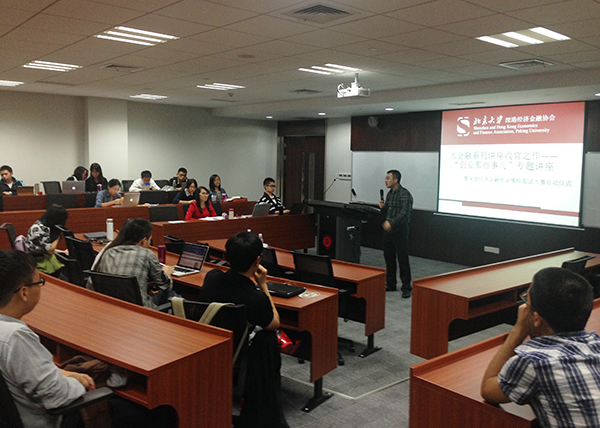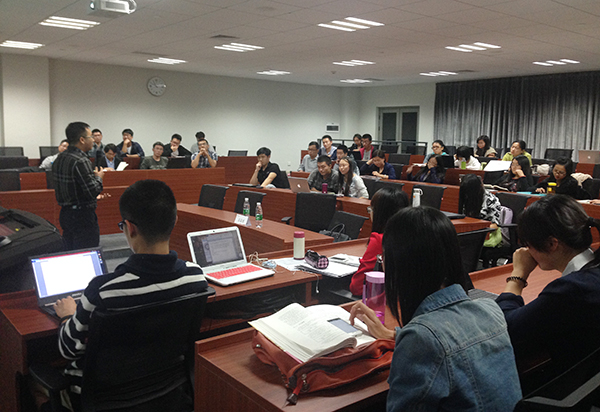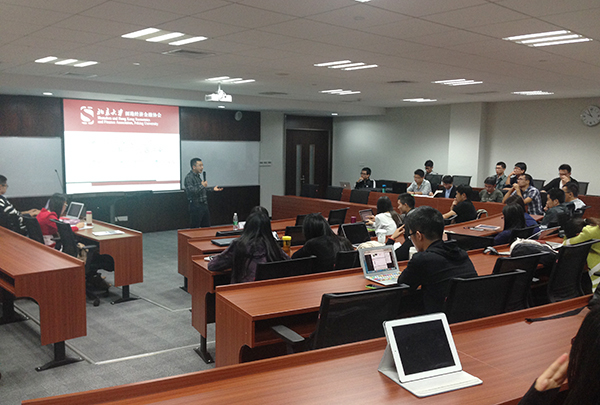On November 20 the Shenzhen and Hong Kong Economics and Finance Association (SHEF) welcomed PHBS alumnus Wu Xianyong to speak about his business start-up experience and to share his understanding of Internet finance. This was his second appearance at PHBS. Wu said that after overcoming the difficulties in starting up his company, he had more to share this time.

CEO of Touna, a P2P [peer-to-peer] company, Wu told the audience that establishing a company is more about practice rather than theory. He explained that Touna focuses on marrying deals between lenders and borrowers, which means a lot of risk. The experience to reduce and bear the risk helped to shape his mind towards risk. He recalled that when he started the company in May 2012, there were only two people in the team including himself. They had to deal with everything in person. When they dealt with a vendor, they spent time counting how much chicken he could sell to calculate the revenue and cash flow, and finally decided how much to loan.
Wu said that only observing and calculating were not enough to control bad debts, however. Therefore, he created a method he calls “small amount mortgage” to reduce bad debts and overcome the declining economy. After accumulating knowledge about mortgages for half a year, he figured out one way to price the risk, and his company grew rapidly after that. Early this year Touna raised its first capital from GF Security Co, Ltd. Today, the company has 1,500 employees, with branches in 28 cities and an IT center with 80 people.
Wu emphasized the importance of courage. He explained that he failed to enter into public sector after graduation and was forced to find a job in Shanghai. In May 2010, he left his job to start a consulting company providing advice for companies who wanted to start an IPO. However, he didn’t get much business because the IPO consulting field was too young. In order to get projects, Wu decided to serve customers at no charge for a half month and then contract with them if they wanted to continue cooperation. Due to his good attitude and diligence, his company expanded to eventually be ranked second among all companies doing IPO consulting. At the end of 2011, he left his first venture to start Touna.

Wu then shared answers to three typical questions about start-ups. First, is it good to start your own business? The answer was yes because it is an era of entrepreneurship, which gives young people a lot of chances. As he mentioned, in cities like Beijing and Shanghai, others will prefer to cooperate with you if you show your ability. The development of the Internet gives everyone a chance to start a company at a very low cost. Everyone can be an entrepreneur if he wants, Wu said.
Second, can everybody succeed in starting a business? Wu said that about 90 percent of the start-ups fail in the end. Therefore, we shouldn’t start a company only because others are doing so or we were not satisfied with our current jobs. We had better think carefully before starting a company.
Next, Wu put forward six factors for success in starting up a business. First is sense of entrepreneurship. An entrepreneur must be charismatic and passionate about what he is doing. If you don’t believe in your product, then you can’t persuade others to believe it. Second is passion. If your company runs out of money at the end of the year, but you still make your teammates believe there is a bright future, then it is a good team. Third is ability of the entrepreneur and the direction of your team. If your team is going the wrong way, then all of your effort is a waste of time. Fourth is finance. You are running with your competitors on the same track without an end. Therefore, the financial support will determine how far you will go. Fifth is talent. Your outlook on how you hire people is important. To be successful, you had better hire young and capable people with a good educational background. Sixth is luck. Combining luck with the previous five factors, you will be successful, Wu said.

During the final Q&A session, Wu answered some questions from students including how to persuade your investors to invest in your company, how he found direction when P2P was just a new concept in 2012, how to distribute ownership with latter joiners, and how to start a company as a young entrepreneur.
Translated by Zhang Tianhong 14' 
















